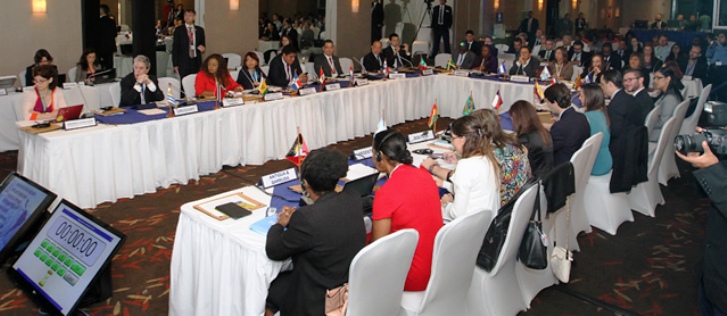Además de ser el primer acuerdo regional ambiental de la región, este inédito instrumento legal es el único tratado emanado de la Conferencia de las Naciones Unidas sobre el Desarrollo Sostenible (Río+20) y el primero en el mundo en contener disposiciones específicas vinculantes sobre defensores de derechos humanos en asuntos ambientales.
SE PUBLICAN LOS TEXTOS AUTÉNTICOS
La Sección de Tratados de la Oficina de Asuntos Jurídicos de Naciones Unidas publicó hoy en su sitio web las copias auténticas certificadas del Acuerdo Regional sobre el Acceso a la Información, la Participación Pública y el Acceso a la Justicia en Asuntos Ambientales en América Latina y el Caribe, adoptado el 4 de marzo de 2018 en Escazú, Costa Rica, durante la novena reunión del Comité de Negociación del acuerdo.
Además de ser el primer acuerdo regional ambiental de la región, este inédito instrumento legal es el único tratado emanado de la Conferencia de las Naciones Unidas sobre el Desarrollo Sostenible (Río+20) y el primero en el mundo en contener disposiciones específicas vinculantes sobre defensores de derechos humanos en asuntos ambientales.
Según establece su artículo 1, su objetivo principal es “garantizar la implementación plena y efectiva en América Latina y el Caribe de los derechos de acceso a la información ambiental, participación pública en los procesos de toma de decisiones ambientales y acceso a la justicia en asuntos ambientales, así como la creación y el fortalecimiento de las capacidades y la cooperación, contribuyendo a la protección del derecho de cada persona, de las generaciones presentes y futuras, a vivir en un medio ambiente sano y al desarrollo sostenible”.
Tal como señaló Alicia Bárcena, Secretaria Ejecutiva de la CEPAL, al momento de su aprobación, “se trata de un acuerdo visionario y sin precedentes, hecho por y para América Latina y el Caribe. Refleja nuestras ambiciones, prioridades y particularidades como región y aborda elementos fundamentales de la gestión y protección ambiental en materias tan importantes como el aprovechamiento sostenible de los recursos naturales, la preservación de la biodiversidad, la lucha contra la desertificación y el cambio climático o la construcción de resiliencia ante los desastres. Enfocado en aquellas personas y grupos más vulnerables de nuestra sociedad, el acuerdo es una herramienta fundamental para implementar la Agenda 2030 para el Desarrollo Sostenible y será determinante para hacer efectiva la igualdad, el crecimiento económico sostenido y el desarrollo sostenible de todas las personas”.
El Acuerdo Regional se abrirá a la firma de los 33 países de América Latina y el Caribe el 27 de septiembre de 2018 en la Sede de las Naciones Unidas en Nueva York, coincidiendo con el debate anual de la Asamblea General del organismo. A partir de ese momento, estará sujeto a la ratificación de aquellos países que lo hayan firmado. Para entrar en vigor, requerirá de 11 Estados Parte.
Atentamente, Secretaría Técnica Acuerdo Regional
Principio 10 CEPAL – Naciones Unidas
http://www.cepal.org/principio10
REGIONAL AGREEMENT ON ACCESS TO INFORMATION, PUBLIC PARTICIPATION AND JUSTICE IN ENVIRONMENTAL MATTERS IN LATIN AMERICA
AND THE CARIBBEAN:
CERTIFIED TRUED COPIES ARE PUBLISHED
The Treaty Section of the United Nations Office of Legal Affairs published today on its web site the certified true copies of the Regional Agreement on Access to Information, Public Participation and Justice in Latin America and the Caribbean, adopted March 4, 2018 in Escazú, Costa Rica, during the ninth meeting of the agreement’s negotiating committee.
In addition to being the first regional environmental agreement, this unprecedented legal instrument is the only treaty to come out of the United Nations Conference on Sustainable Development (Rio+20) and the first in the world to contain specific binding provisions regarding human rights defenders in environmental matters.
According to its Article 1, the agreement’s main objective is “to guarantee the full and effective implementation in Latin America and the Caribbean of the rights of access to environmental information, public participation in the environmental decision-making process and access to justice in environmental matters, and the creation and strengthening of capacities and cooperation, contributing to the protection of the right of every person of present and future generations to live in a healthy environment and to sustainable development.”
As pointed out by Alicia Bárcena, ECLAC’s Executive Secretary, at the time of its approval, “this is a visionary, unprecedented agreement, made by and for Latin America and the Caribbean. It reflects our ambitions, priorities and particularities as a region and encompasses fundamental aspects of environmental management and protection in such important matters as the sustainable leveraging of natural resources, the preservation of biodiversity, the struggle against desertification and climate change, and resilient reconstruction after disasters. Focused on the most vulnerable persons and groups of our society, the agreement is a fundamental tool for the implementation of the 2030 Agenda for Sustainable Development and will be a determining factor in making equality, sustained economic growth and sustainable development effective for all persons.”
The Regional Agreement will be open for signature by the 33 countries of Latin America and the Caribbean as of September 27, 2018 at United Nations Headquarters in New York, coinciding with the organization’s annual General Assembly debate. As of that time, it will be subject to ratification by any countries that sign it. In order for it to enter into force, it will require 11 States Party.
Sincerely,
Technical Secretariat Regional Agreement
Principle 10 ECLAC – United Nations
http://www.cepal.org/en/principle10

